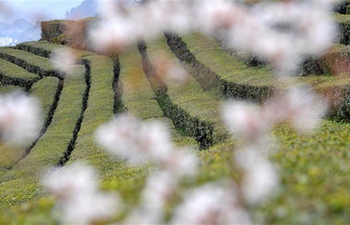WASHINGTON, Feb. 28 (Xinhua) -- A study published Wednesday in the journal Science Advances has shown that a kind of bacteria commonly found on human skin can protect against cancer.
Researchers led by Richard Gallo, a professor of dermatology at University of California, San Diego, identified a strain of Staphylococcus epidermidis, common on healthy human skin, that can exert a selective ability to inhibit the growth of some cancers.
The unique strain of skin bacteria produces a chemical that kills several types of cancer cells but does not appear to be toxic to normal cells, Gallo said.
Gallo's team discovered the strain produces the chemical compound 6-HAP. Mice with the strain on their skin that was made not to produce 6-HAP had many skin tumors after being exposed to cancer-causing ultraviolet rays (UV), but mice with the strain producing 6-HAP did not.
According to Gallo, 6-HAP is a molecule that impairs the creation of DNA and prevents the spread of transformed tumor cells, thus having a potential to suppress development of UV-induced skin tumors.
Mice that received intravenous injections of 6-HAP every 48 hours over a two-week period experienced no apparent toxic effects, and when they are transplanted with cancerous melanoma cells, the tumor size was suppressed by more than 50 percent compared to controls without injections.
"There is increasing evidence that the skin microbiome is an important element of human health," said Gallo.
Gallo told Xinhua that "the bacteria that live on our skin are very resistant to normal washing," and so he believed that "simple washing would not remove these beneficial organisms."
"It is possible to use these bacteria or the product of these bacteria in a product that people could apply to the skin," said Gallo.
Also, the strain appears to add a layer of protection against other forms of cancer. Further studies are needed to understand if 6-HAP can be used for prevention of cancer or if loss of it increases cancer risk, said Gallo.

















